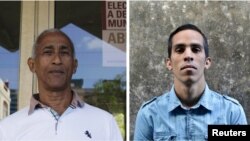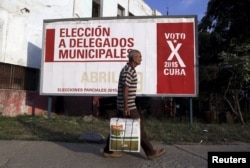In a rare challenge to Cuba's political system from within, two government opponents are on the ballot for upcoming elections, only to find that officials have altered their biographies to portray them as dangers to the revolution.
Hildebrando Chaviano, 65, and Yuniel Lopez, 26, are running for municipal assembly in Havana on April 19 after winning endorsement from their neighbors in a show-of-hands vote at public meetings last month.
The biographies they wrote to be displayed publicly have been changed by local officials, the two candidates said.
Those biographies now say the men have ties to “counter-revolutionaries” based or financed abroad, code words in Cuban politics for individuals out to harm the country.
Their candidacies are the first electoral challenge to the Communist Party since the United States and Cuba agreed in December to renew diplomatic ties and end five decades of hostility, and the official response highlights the limits to political freedoms on the island.
They are just two of 27,379 candidates competing for 12,589 municipal assembly posts, the first rung on Cuba's political ladder.
Cuba says its electoral system is one of the world's most democratic because municipal assembly delegates are nominated by neighbors and do not have to belong to the Communist Party.
But the path to the National Assembly, and ultimately the presidency, is controlled by the party.
Biographies rewritten
Chaviano's altered biography says his military service ended after six years due to “conduct incompatible with the service,” while he contends he merely chose not to re-enlist. It also deleted much of his educational history but includes that he took an Internet course at the U.S. diplomatic mission, emphasizing his ties to a hostile foreign power.
“All that's left is for them to put 'wanted' across the page,” said Chaviano, a lawyer and dissident who writes for the Diario de Cuba website, which is fiercely critical of the government.
Lopez belongs to an outlawed party founded by Huber Matos, who fought alongside Fidel Castro in the Cuban revolution but later turned against him and was jailed before going into exile.
Lopez, who describes himself as an opponent of the government, said the label “counter-revolutionary” is another way of calling him a terrorist. “Here the idea of a counter-revolutionary is someone who sabotages the economy or plants bombs.”
The president of Cuba's National Electoral Commission, Alina Balseiro, told state television that each local commission would try to be even-handed in editing biographies.
No campaigning is allowed. Instead, the biographies and accompanying photos of competing candidates are posted side-by-side in public places.
One election official said any changes would have taken place after an official investigation to verify the biographies as originally submitted, but she refused to discuss any individual case.
“There is equal treatment and opportunity for all, without favoritism,” said Yusimi Perez, second in charge of the electoral commission for the Havana municipality known as Revolution Square where Chaviano is a candidate. “We don't have a single case among our 217 nominees who have come to us about any peculiarity with the biographies.”
Chaviano said he argued point-by-point with Perez and other officials about his altered biography but in the end he signed it. “Signature or no signature, it was going to remain like it was.”
Lopez said he refused to sign his but the altered version was published anyway.
Dissidents
Cuba's dissidents generally boycott elections, describing them as a farce. Some occasionally seek office but rarely win the first vote by a show of hands in order to get on the ballot.
None have ever gone further, said August Arnold, author of a 2013 book about Cuba's electoral process.
Arnold, who says the system is democratic but in need of reform, said biographies are normally a collaboration between candidates and the electoral commission.
“If they include derogatory comments, it goes against the spirit of the electoral law and the system,” Arnold said. “I don't think it helps the revolution to go out of their way to put down people like this.”
The government dismisses dissidents as a tiny minority who receive money from the United States to destabilize the government. Many Cubans are suspicious of dissident leaders.
If elected, Chaviano said he will try to improve a housing shortage and feed the elderly, noting he sees people combing through trash even in his upscale neighborhood of Vedado.
Lopez lives in the poor Santa Amalia neighborhood and wants to repair broken sidewalks and streets.
Both men said they hope the attempt to blackball them will backfire.
“They could be in for a surprise,” Chaviano said. “This could get me more votes when people see I'm different from the other candidates.”






